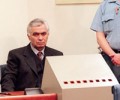Pressure on Human Rights Defender in Serbia
I am aware that I do not have support in Serbia for what I do and that there are a lot of people within the state insititutions who are attacking me in order to draw public attention away from the misdeeds they committed in the past. Vojislav Šešelj and his ultra-nationalist party, Serb Radical Party [SRS] are among these people. The trial of Vojislav Šešelj for war crimes and crimes against humanity committed during the armed conflicts in the former Yugoslavia, began in The Hague in December 2007. During the main hearing, held in January 2008, defendant Šešelj started revealing information concerning my privacy and confidential contacts with witnesses of war crimes.
The defendant asked witness Goran Stoparić whether he used to have the keys to my apartment and whether he spent time in it. He also asked him about the times when I was and when I wasn’t present in the apartment. Judge allowed defendant Šešelj to reveal in public session that the witness [Goran Stoparić], who testified in the trial held before the Belgrade District Court for the murder of 14 Albanian women and children in Podujevo, Kosovo, committed by his fellow fighters from the Scorpions unit, slept over in my apartment. Then, the defendant revealed before the court that I sent an SMS to the witness [Goran Stoparić] a day earlier and that I talked to him, and the judge did not even ask him how he found out about it. The defendant did not reveal the content of the message because it had nothing to do with the trial, but he did insist the witness confirm the defendant’s conclusion that by sending messages to the witness, I had put pressure on him. The Presiding Judge did not intervene, at least during the public session. Therefore, the manner and language I used to allegedly put pressure on the witness to testify against the defendant remains unclear. The defendant revealed certain information thus trying to present me as a person, who hosts former combatants in her apartment and prepares them to testify against Šešelj and other war crimes indictees. The judge failed to intervene again.
I found out that the trial of Šešelj was interrupted because of my SMS from a Frankfurt News journalist who said that the Serb Radical Party had forwarded this information to their editorial office. This happened before the defendant repeated in the public session his findings that he obviously had already presented earlier in the private session. Then, on 25 January 2008, Politika, the most circulated the daily newspaper in Serbia, published a cover story stating that the trial in The Hague was temporarily interrupted because of my SMS. It relayed all the details about Šešelj’s findings concerning my alleged influence on witness Stoparić and support provided to persons, who testified against war crimes indictees. The purpose of the article in Politika was to give support to the so-called “patriots” in Serbia against the so-called “traitors”, as Šešelj and his party call the human rights defenders.
After all, I have the right to ask who delivers information to The Hague indictee Šešelj? In view of this, I would like to mention that the Serb Radical Party General Secretary and a member of the Vojislav Šešelj’s Defence Council, Aleksandar Vučić, stated on the TV Fox broadcast titled Recite narodu (Tell the People) on 29 November 2007 that the party acquires information and documents from the Security Information Agency (BIA). On the same show hosting both of us, he threatened to put me in prison as soon as the Serb Radical Party [SRS] comes to power, adding that they would be merciful and would give me fruit, vegetables, and everything else that I may need.
No one from the Serbian Government has reacted to the news that the Serb Radical Party has access to SMS messages of citizens, especially human rights activists, and that it has control over their contacts. It is obvious that the Security Information Agency serves the Serb Radical Party and Vojislav Šešelj’s Defence Council. However, judging by the Radicals’ boasting, one thing is sure. It is not only this service that does this, but also military, security, and intelligence agencies.
Sincerely, 30.01.2008.
Nataša Kandić







